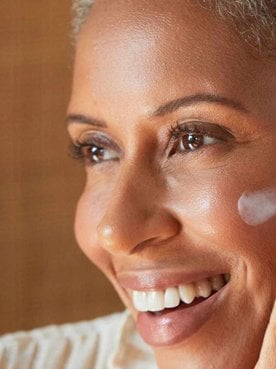What are peptides?
Peptides are short chains of two or more amino acids – the building clocks of proteins like collagen or elastin. These proteins are essential for maintaining the skin’s firmness, elasticity, and overall condition. The body naturally produces peptides, but synthetic peptides for skin – used in skincare and cosmetics – can be also applied topically to the skin to support your collagen, elastin, and keratin proteins.
How do peptides work in skincare?
Skin proteins are essential for the structure and appearance of skin, but there are plenty of factors – such as natural ageing, diet, stress, or other health concerns – that can slow protein production down. When used as a topical skincare ingredient in a serum or moisturiser, peptides help stimulate collagen production and strengthen the skin moisture barrier.
Types of peptides explained
The different types of peptides are determined by the number of amino acids that make up the peptide. Two of the most common types of peptides for skincare are dipeptides and tripeptides.
1. What are dipeptides?
Dipeptides are molecules made up of two amino acids that are joined by a single peptide bond. Dipeptides help promote structural proteins: collagen, elastin, and keratin.
2. What are tripeptides?
Tripeptides are short chains of three amino acids joined by two peptide bonds. They are smaller than other peptides and proteins, so they’re more easily absorbed into the skin. Like dipeptides, tripeptides work by signalling the skin to ‘regenerate’ itself.
4 key benefits of peptides for skin
By sending reparative signals to the body, topical peptides for skin can:
- Help stimulate collagen production
- Smooth the appearance of fine lines and wrinkles
- Support hydration and the skin moisture barrier
- Help improve skin firmness and elasticity
Continue reading as we dive into these four impressive benefits of peptides for skin.
1. Stimulates collagen production
One of the reasons peptides have become such a popular skincare ingredient is for their ability to help stimulate the skin’s collagen production – the essential protein that keeps skin taut, smooth, and healthy-looking.
The body naturally produces collagen, but once you hit your twenties, your collagen production drops by 1% each year1. This is what makes peptides for skin especially beneficial in anti-ageing skincare routines.
We recommend integrating a targeted peptide-rich serum like the Revitalift Laser X3 Tri-Peptides Age-Correcting Serum. This serum can be used daily between cleansing and moisturising to visibly plump and tighten skin.
1https://www.oaepublish.com/articles/2347-9264.2020.153
2. Helps smooth visible fine lines and wrinkles
Natural collagen loss, along with cumulative exposure to environmental stressors like UV rays, can accelerate the visible ageing process. But since peptides support proteins like collagen and elastin, they can help minimise the depth of textural concerns like fine lines and wrinkles.
For an instant smoothing effect on dynamic wrinkles – like forehead creases – infuse the skin with nourishing peptides using the Revitalift Laser X3 Triple Action Sheet Mask.
3. Bolsters hydration and the skin moisture barrier
The skin moisture barrier has the ever-important task of preserving hydration at the skin surface and providing protection against from outside stressors like pollution and UV rays – two major contributors of premature ageing.
One of the major benefits of peptides for skin is that they support your skin’s structure, which can help strengthen your skin moisture barrier. A robust skin moisture barrier ensures that your skin stays plump and hydrated, while keeping out skin-damaging stressors.
4. Enhances skin firmness and elasticity
A loss of firmness and elasticity become common skin concerns as we age. Over time, our elastin and collagen reserves break down – which can result in skin losing its firmness and elasticity. However, using peptides for skin can help address skin sagging and promote tauter, plumper, firmer-looking skin.
How to use peptides in your skincare routine
If you’re ready to integrate the benefits of peptides for skin into your daily regime, we’ve curated some final tips to get you started.
- Peptides can be used both morning and night: The skin naturally regenerates itself at night, and peptides can support this overnight recovery. If applied in the morning, peptides also support your skin moisture barrier – your skin’s first line of defence against outside stressors.
- Seek out peptide-rich serums and moisturisers: Serums can effectively deliver concentrated ingredients to the skin surface. Be sure to apply to cleansed skin, then follow with a nourishing anti-ageing moisturiser like the Revitalift Laser X3 Retinol + Niacinamide Pressed Night Cream.
- Pair with complementary ingredients: You can bolster the anti-ageing benefits of peptides with other efficacious ingredients like retinol, hyaluronic acid, and vitamin C.
- Protect your skin with SPF each day: SPF is one of the most effective – and preventive – skincare products at your disposal. So, make sure you’re supporting your peptide skincare routine with daily sunscreen application.
Using peptides for skin can help support your skin through collagen loss as you age. But why is collagen so important? Find out what collagen does for skin – and its benefits – next.





